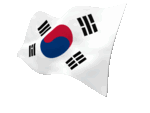The Bull of Peace
페이지 정보
본문

The new Year of 1997 in Korea had an unusual start. The usual, optimistic and wishful hope and expectation for a better and brighter year lying ahead were remarkably muted, while dark predictions and premonitions prevailed. The huge, snowballing amount of trade deficit at the end of the previous year was one of the ominous indexes that foretold coming of hard times and strange turns of events. Indeed, business firms began to fire a mass of white-collar workers for the first time in our recent history, and a nation-wide general strike was called by the union leaders to protest and oppose the new labor law, and thousands of workers throughout the country hit the streets, and riot-police began to fire tear-gas bombs again to disperse them. And we were just made to sit and watch the mass starvation taking place in the North Korea without raising a finger. The big and sweet dreams we had just 4 years ago at the start of the "civilian" government came to an end with bitter disillusion. January of 1997, the Year of Ox, was indeed a "winter of discontent".
However, there was a news that dispelled all the dark clouds hung over my heavy mind at a stroke. Like a beacon upon a hill at night for the sailors of a ship who lost heart and direction before the mounting waves, this seemingly trivial and unimportant news revived my dwindling hope for the future, and restored my faith in humanity. It was a unique and refreshing one, good enough to make me forget and dismiss, even for a moment, all the other depressing, but more important news events concerning our country and people. A starving bull stranded in a deserted islet was rescued. A bull rescued? What a big deal!
Yes, it was a big deal for us. It was a military operation code-named 'Operation Owl.' At 12:30 sharp, January 17, a commando of 8 marines and 1 military veterinarian, with their faces all blackened and in full combat fatigues, with a radio, but only with no fire-arms, left a military base in two rubber boats for an uninhabited islet 500 meters off the northern coast of Kimpo. Their mission was to capture a stray bull in the islet, and bring it back to the main land. They landed on the islet, found the bull eating dried grass in the reeds, shot it with a tranquilizing bullet, and brought it back safe and sound. Mission accomplished at 2:00 p. m. without a casualty.
The bull rescued was found to be in a very bad condition. Due to malnutrition the weight of the bull was reduced to 150 kg, and it was covered with many cuts all over its body. One of the legs was severely wounded, and bloody pus was running. They said that it would be sent to the National Quarantine Office in Inchon for medical examination and treatment for about a month, and then would be displayed to the public for a certain period of time in a specially-made barn in Kimpo, and then would be reared until its natural death by the soldiers in a farm at the Peace Village near DMZ. The bull was officially named "The Bull of Peace" by the mayor of Kimpo.
More than two weeks had passed since it was first reported in the newspaper and on TV that two stray oxen were sighted in the islet of Ryudo without any measures being taken. They would surely die of starvation in the cold weather of winter, were there not human assistance. They were most likely to have been carried to the islet in the flood that had swept away many cattle farms in the main land. It was soon reported again that one of the two ceased to be seen. Without human help the death of the remaining one was certain, only a matter of time.
People living elsewhere in the world, not in this peninsular, might well laugh at the fuss we made over a domestic animal in trouble. Anyone who has just a good will would go in there and bring it back. But, for us, it could not be so simple as that. It could start a war. The islet on which the bull was stranded is located in the so-called "neutral sea zone," the DMZ in the sea between the South and the North, and according to the Armistice Agreement signed in 1953 neither party can go in there without mutual consent or permission. The islet is under constant military surveillance from both sides that are heavily armed and strongly fortified. In other words, the islet in question, is a forefront of confrontation and hostility between the South and the North.
We notified the North of our intention of saving the bull, and asked for their cooperation. We suggested a joint-project for the bull, such as feeding the bull together in the islet. If the North had accepted our proposal, the bull in trouble in the Year of Ox would have brought us the best New Year's present that could be thought of for both of us. It would be a small, but a firm step towards peace and reconciliation, not in abstract and empty words, but in concrete deed and action, after half a century of national division. As long as the bull live in the islet in peace and freedom, being fed and taken care of by the hands of the South and the North, peace in the peninsular would be protected and maintained, not by the the Armistice Agreement, not by the DMZ, but by our love and care for the life of a dumb animal. Unfortunately, they did not comply with our proposal. But, fortunately enough, they did not stop us from doing the rescue work.
I am very glad and happy to find myself living in a country where and in a time when people have come to pay attention to and be concerned with the life and death of a poor animal in trouble and pain. I know there are many individuals and and private groups in our country who love animals and who are very much concerned with the life and death of animals, but the rescue of the bull was unique and refreshing in its kind and nature. It was carried out at the risk of human lives, and of some possibility of unwanted armed conflict, big or small. And it was done when all our attention was directed to the general strike that threatened our daily lives. Saving a starving bull in a deserted islet could be a luxury that we could easily ignore or dispense with. But we listened to the cry of the bull dying alone in cold and starvation, and took action, simply because we could not go to warm bed and fall asleep in peace of mind.
I don't think and I don't believe that the material prosperity and affluence we have achieved and accumulated so far have changed our nature for the better a little bit, but watching the the rescue work on TV, I felt that something have changed in us. If we had had the same kind of situation just decades ago, we would most probably have let the poor bull go its own way, as the North did this time. Or if we should have tried a rescue, the purpose of which would have been a very practical one, such as filling our empty stomachs. The collective effort and spirit that have been displayed by us in the rescue of a dumb animal was a clear and meaningful signal that the same good spirit and courage with which we have executed the work successfully could also be mobilized in and extended to the rescue of our starving brothers and sisters in the North, more willingly and more efficiently, when time comes.
(February 2, 1997)
- 이전글On Buying Books 21.01.13
- 다음글The Old Marketplace 21.01.13
댓글목록
등록된 댓글이 없습니다.








